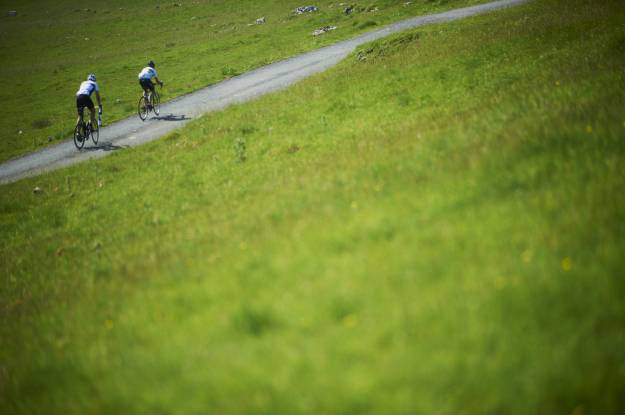Cycling is on the up in our towns and cities and many progressive councils throughout Britain are investing substantial resources into cycling infrastructure and cycling promotion in their locales.
The process began in 2005 with the creation of model 'Cycling Demonstration Towns' a concept created by the government agency Cycling England. The intial pilot group of six towns were given £1.5 million to spend over three years. These towns were joined by 12 others in 2009, when they became known simply as Cycling Towns at which point additional funding was injected.
With the abolition of Cycling England in 2011, a new funding stream was announced by Transport Minister Norman Baker - the £560 million Local Sustainable Travel Fund - allowing local authorities throughout the country to bid for a share of the capital.
Spurred on by the success of the 18 Cycling Towns, other pro-cycling local authorities have risen to the challenge and set about improving cycling provision in their towns and cities. Over the coming weeks, we'll be adding comprehensive guides to each of these towns; the original 18 Cycling Towns plus further progressive towns and cities who are working closely with British Cycling's Recreation and Partnerships team to build a brighter future for cycling at a local level.
| Town and City Guides |
| Bath - British Cycling partner city Bath in Somerset is home to the very first Sustrans traffic-free path and has long been a cycling stronghold. |
| Edinburgh - Akin with many other major European cultural centres, Edinburgh is a city with a strong cycling ethos. The grand and elegant city has a well-developed network of on and off-road routes, a proactive council and strong local cycling advocacy. |
| Blackpool - British Cycling partner town Blackpool is one of the second tranche of government funded ‘Cycling Towns’, designated as such is 2009 with the aim of creating an environment more conducive to cycling. |
| Lancaster - Lancaster with Morecambe is one of the original Cycling Demonstration Towns, getting its status in 2005 and with it a host of improvements in terms of cycle routes, parking and other facilities. The town’s riverside and canals provide the framework of Lancaster’s cycle routes, with the iconic Millennium Bridge the keystone. |
| Middlesbrough - Middlesbrough Council is one of a number of local authorities working closely with British Cycling to grow cycling of all kinds.The Teesside town is well served by local, regional and national cycle routes and boasts a new cycle centre and cycle circuit – a clear indication that Middlesbrough is a town which means business when it comes to promoting cycling. |
| Brighton and Hove - Brighton and Hove is one of the original six Cycling Demonstration Towns - designated as such by Cycling England in 2005 and benefitting from significant investment to improve cycling infrastructure. |
| York - The walled city of York may be steeped in history but it’s bang up to date when it comes to cycling infrastructure. |
| Woking - £1.82M of Cycling Town funding resulted in the creation of Cycle Woking, a joint venture between Surrey County Council and Woking Borough Council, including an online portal for cycling information and improvements in cycle routes and parking. |
| Watford - Bounded by the London mainline railway, the M1 motorway and the Grand Union Canal, the busy town of Watford is a transport nexus. For cyclists too, the town is well served with transport infrastructure. |
| Stoke-on-Trent - Epicentre of the potteries during the Industrial Revolution, Stoke has an extensive canal network, with the Trent & Mersey and Caldon Canals converging on the town.Today the canals serve as major cycling and walking arteries. However the towpath routes are just part of a whole network of routes and amenities for Stoke’s cyclists. |
| St Albans - St Albans in Hertfordshire is one of a growing number of towns and cities that have partnered with British Cycling to help realise their civic cycling goals. |
| Southport - Southport was granted Cycling Town status in 2008 and subsequently benefitted from three years of Cycling England funding which ended in 2011. Since then, Sefton Council has successfully attracted a share of the DfT's Local Sustainability Transport Fund to continue developing routes, amenities and resources to encourage cycling in the seaside town. |
| Southend - Southend-on-Sea in Essex was one of the second wave of towns in England to receive Cycling Town status and funding through Cycling England. Find out how Cycle Southend has changed the landscape for the Essex town's cyclists. |
| Southampton - Southampton’s riverside cycle paths and plentiful green-spaces make it a great place to ride a bike. The maritime city has been a British Cycling partner town for a number of years, hosting successful Sky Ride events since 2010. |
| Manchester - Commuter cycling is growing in Manchester. Pull up at the traffic lights in the city centre at peak hour and you’re seldom alone in the advanced stop box. There’s a definite cycling scene, partly based on Manchester’s historical position as a strong cycling city and fed by the growing tribes of urban commuters, fixie riders and a huge student population, many of whom move by bike. |
| Ipswich - Ipswich in Suffolk is a city with a strong cycling tradition and a well developed network of local, regional and national cycle routes. The city is also one of British Cycling's key 'partner towns', working with the national governing body to promote cycling of all kinds. |
| Birmingham - Despite having a reputation as motor-city, getting around Birmingham by bike is nowhere as difficult as non-Brummies would have you think! Birmingham has a wonderful network of leafy back-streets, routes along green corridors and canals (more than Venice!) that make getting around the city by bike much less stressful then you might imagine. |
| Norwich - The city of Norwich has a new sustainable transport strategy, with cycling as one of its key focuses. A network of ‘pedalways’ and ringways is just one part of a range of measures to make the Norfolk city a more pleasant place to cycle. |
| Slough - Geographically, Slough is an ideal town for cycling – a compact urban area measuring just seven miles across and three miles north to south. Its flat terrain, together with a number of traffic-free route options make cycling a viable alternative to driving for short urban journeys. |
| Shrewsbury - A great riverside cycle route, flat terrain, an impressive track record in boosting cycling and further funding secured for the medium term, former 'Cycling Town' Shrewsbury hopes to build upon its already impressive achievements. |
| Preston - British Cycling partner town Preston is rapidly developing a reputation for being one of the most progressive, cycle-friendly towns in the UK. At the heart of the National Cycle Network, with a myriad of traffic-free routes, the brand new Guild Wheel circular greenway and proactive councils, the Lancashire town is a great place to ride a bike. |
| Plymouth - British Cycling partner town Plymouth is a great example of a pro-active city council, with a clear aim of encouraging cycling through a range of measures including routes, parking, cycle training and cycle hire. |
| Peterborough - Peterborough is one of British Cycling’s partner cities, working together to get more city residents cycling more often, helped by the city’s host of cycle routes, cycling parking and other resources. |
| Liverpool - Like many big British cities, Liverpool has seen an urban renaissance over the last decade, with large scale redevelopment of the city centre and dockland areas. Improvement in the transport infrastructure is a key part of any urban renewal project and this has meant been considerable improvements in provision for commuter cyclists in Liverpool. |













